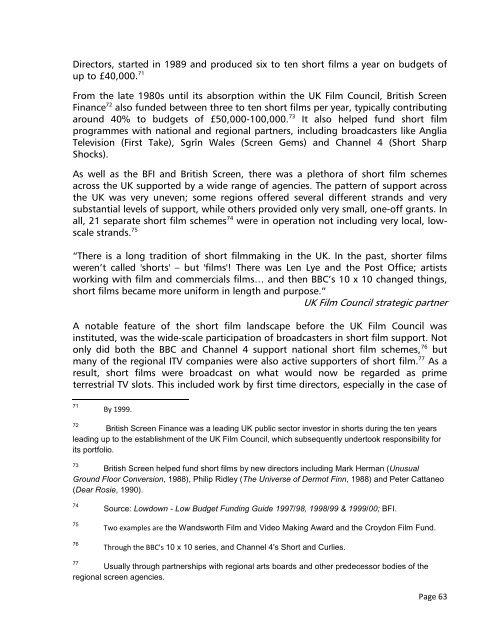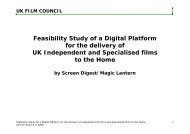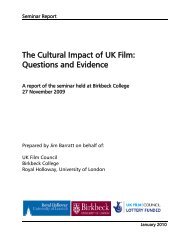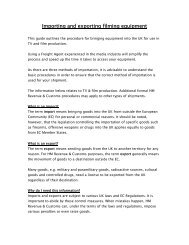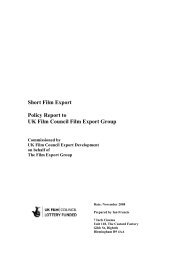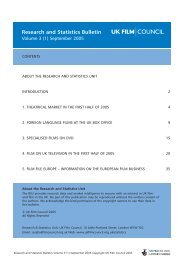Northern Alliance - BFI
Northern Alliance - BFI
Northern Alliance - BFI
You also want an ePaper? Increase the reach of your titles
YUMPU automatically turns print PDFs into web optimized ePapers that Google loves.
Directors, started in 1989 and produced six to ten short films a year on budgets of<br />
up to £40,000. 71<br />
From the late 1980s until its absorption within the UK Film Council, British Screen<br />
Finance 72 also funded between three to ten short films per year, typically contributing<br />
around 40% to budgets of £50,000-100,000. 73 It also helped fund short film<br />
programmes with national and regional partners, including broadcasters like Anglia<br />
Television (First Take), Sgrîn Wales (Screen Gems) and Channel 4 (Short Sharp<br />
Shocks).<br />
As well as the <strong>BFI</strong> and British Screen, there was a plethora of short film schemes<br />
across the UK supported by a wide range of agencies. The pattern of support across<br />
the UK was very uneven; some regions offered several different strands and very<br />
substantial levels of support, while others provided only very small, one-off grants. In<br />
all, 21 separate short film schemes 74 were in operation not including very local, lowscale<br />
strands. 75<br />
“There is a long tradition of short filmmaking in the UK. In the past, shorter films<br />
weren‟t called 'shorts' – but 'films'! There was Len Lye and the Post Office; artists<br />
working with film and commercials films… and then BBC‟s 10 x 10 changed things,<br />
short films became more uniform in length and purpose.”<br />
UK Film Council strategic partner<br />
A notable feature of the short film landscape before the UK Film Council was<br />
instituted, was the wide-scale participation of broadcasters in short film support. Not<br />
only did both the BBC and Channel 4 support national short film schemes, 76 but<br />
many of the regional ITV companies were also active supporters of short film. 77 As a<br />
result, short films were broadcast on what would now be regarded as prime<br />
terrestrial TV slots. This included work by first time directors, especially in the case of<br />
71 By 1999.<br />
72 British Screen Finance was a leading UK public sector investor in shorts during the ten years<br />
leading up to the establishment of the UK Film Council, which subsequently undertook responsibility for<br />
its portfolio.<br />
73 British Screen helped fund short films by new directors including Mark Herman (Unusual<br />
Ground Floor Conversion, 1988), Philip Ridley (The Universe of Dermot Finn, 1988) and Peter Cattaneo<br />
(Dear Rosie, 1990).<br />
74 Source: Lowdown - Low Budget Funding Guide 1997/98, 1998/99 & 1999/00; <strong>BFI</strong>.<br />
75 Two examples are the Wandsworth Film and Video Making Award and the Croydon Film Fund.<br />
76 Through the BBC's 10 x 10 series, and Channel 4's Short and Curlies.<br />
77 Usually through partnerships with regional arts boards and other predecessor bodies of the<br />
regional screen agencies.<br />
Page 63


